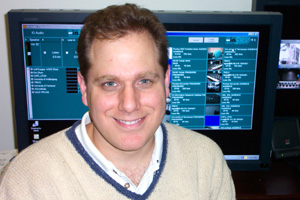Foster to lead Computation Institute
By Steve KoppesNews Office
 Ian Foster  Jonathan Silverstein | |
Ian Foster has been appointed director of the Computation Institute, a joint project between the University and Argonne National Laboratory that addresses the most challenging computational and communications problems arising from a broad range of intellectual pursuits.
Foster, whose appointment was effective Wednesday, March 1, succeeds Rick Stevens as institute director. Stevens serves as Acting Associate Laboratory Director for Physical Biological and Computing Sciences at Argonne and Professor in Computer Science at the University.
Also appointed, as Associate Director of the Computation Institute, is Jonathan Silverstein, Assistant Professor in Surgery at the University.
“The principal recommendation of President Bush’s Information Technology Advisory Committee called upon the federal government, academia and industry to work together to produce advances in computational science that will ensure America’s scientific leadership, economic competitiveness and natural security,” said Thomas Rosenbaum, Vice President for Research and for Argonne National Laboratory.
“Ian Foster and Jonathan Silverstein are the perfect team to bring together University and Argonne scientists from across the disciplines to lead the Computation Institute to the fore in this grand challenge.
A pioneer in grid computing, Foster is Associate Director of Argonne’s Mathematics and Computer Science Division and the Arthur Holly Compton Distinguished Service Professor in Computer Science at the University. The high-speed networking of grid computing provides access to both raw computer power and special data or instrument resources on demand, much the way an electric power grid provides electricity.
“Computation plays an increasingly central role in many disciplines in the sciences, medicine and the humanities,” Foster said. “What we want to be about is not just doing bigger computations, but working out how to apply these computation tools in new ways and to new disciplines.”
The Dec. 26, 2005, issue of Network World named Foster one of “The 50 most powerful people in networking,” a list that includes Bill Gates and Steve Ballmer of Microsoft and Larry Ellison of Oracle. Said Network World: “Foster pops to mind when you think about people powering the grid movement.”
The Grid movement is largely supported by the Globus Project, which Foster co-founded in 1995 with Steve Tuecke, formerly of Argonne but now chief executive officer of Univa Corporation, and Carl Kesselman of the University of Southern California. Since then they have initiated a variety of commercial and academic enterprises based on their software package for building Grid systems and applications, the Globus Toolkit.
For example, last November the National Science Foundation awarded $13.3 million to Foster and Kesselman for further development of the open-source Globus software, which is freely available for use and modification by programmers. It is designed to coordinate the use of geographically distant computers.
Globus underpins numerous projects, including TeraGrid, a national system of interconnected computers that scientists and engineers will use to solve some of their most challenging problems. TeraGrid, which is overseen by the Computation Institute, could potentially affect every major scientific discipline that requires intensive computing capabilities, including disease diagnosis, weather forecasting and aircraft design simulation.
And in 2004, Foster, Kesselman and Tuecke founded Univa Corporation, based in Elmhurst, Ill., to promote the commercial use of Globus technology. Then last October, IBM, the world’s largest information technology company, licensed Globus software from Univa for commercial release.
Silverstein is Director of the Center for Clinical Information at the University Hospitals and a proponent of the use of grid computing to improve patient safety and academic efficiency in biomedicine. He also is one of three leaders of the Chicago Biomedical Consortium. The consortium is now deploying, with philanthropic support, a 10-year, estimated $50 million initiative to build collaborative research between the University and Northwestern University and the University of Illinois at Chicago. Silverstein specializes in the application of computers and other technology to the analysis of vast biomedical databases, as well as the design, implementation and evaluation of high-performance collaboration environments for surgeons.
More than 120 researchers at Argonne and the University belong to the Computation Institute. Founded in 1999, the institute encompasses research in the biological, physical, social and financial sciences, medicine, law, the arts and the humanities.
![[Chronicle]](/images/sidebar_header_oct06.gif)